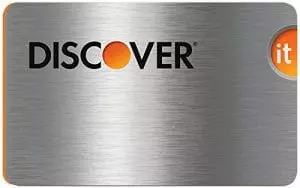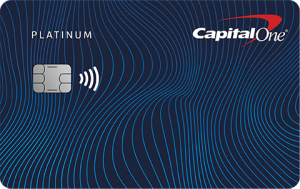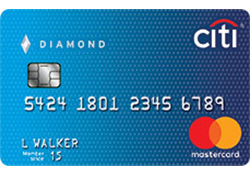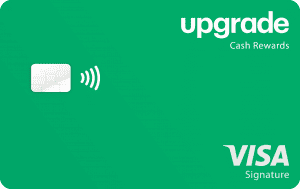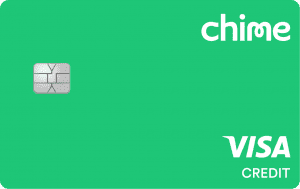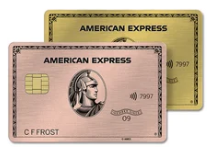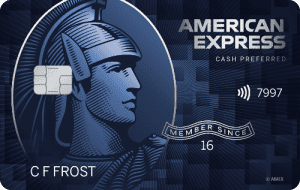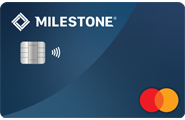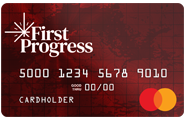Table Of Content
Are you ready to get your first credit card?
According to Experian Data, the average, Americans hold an average of 3.84 credit card:
When Should You Get a Credit Card?
Credit cards are handy tools and have a lot of advantages if you know how to use them correctly. They can build your credit, enable you to earn points and rewards, and manage your expenses quickly and effectively.
However, to avoid credit card mistakes and take advantage of the benefits, it's better to understand how a credit card works, its main features, and which things you must keep in mind.
Getting your first credit card is mainly relevant for the first bullet. However, there are some additional scenarios when you consider adding a credit card:
- When you turn 18: Most people get their first credit cards when they turn 18 because it is the minimum age requirement. This is also an excellent time to build a good credit history.
- Steady source of income: When you have a stable job or business that brings steady cash flow, it may be an excellent time to get a credit card. The inflow from your career or business would be used to upset your credit card debt.
- Good credit score: If you have a good credit score, you will get better deals on credit cards. A good credit score reduces your interest payments and increases your credit limit because you are deemed to be less risky by lenders.
- You want to finance a large purchase: Perhaps you want to finance a large purchase but don't have enough funds. A credit card would come in handy. According to CNBC, many credit cards offer introductory APR periods with 0% interest rates which can be used to finance large purchases. Make sure you have a repayment plan before using a credit card to finance a large purchase.
Can I Get My First Credit Card With No Credit History?
Getting a credit card without history is possible, but you have limited options in terms of the cards types, credit limits, and payments terms. Starter cards allow people with no history to own credit cards. Types of starter credit cards that new borrowers can explore are student credit cards and secured credit cards.
The former is designed for college students while the latter requires a refundable security deposit which is refundable is used as the borrower’s credit limit. There are also no deposit starter cards that do not require provide a refundable security deposit to activate your account.
Alternatively, you could become an authorized user on another person’s card. The card bears your name on it, but the primary cardholder will be responsible for making payments. This may help build your credit, depending on the issuer and if they report to the credit bureaus.
There are some challenges with getting a credit card without history. For instance, you may pay higher rates because lenders have no records to gauge your credit score or risk level. Most lenders would issue a lower credit limit.
How Old Do You Have To Be To Get Your First Credit Card?
You have to be at least 18 years of age to apply for a credit card. Being under the age of 21, for instance, the lender requires you to show proof of income or assets that show that you will be able to repay the amount you charge.
If you cannot provide this information, your parents or another adult will have to make you an authorized user on their account.
If you’re a college student with a part-time job, you may have enough income to meet the requirements of getting a student credit card. Above all, it’s imperative that you know that you’ll have full responsibility of paying your bill each month.

How To Get My First Credit Card?
Getting your first credit card can be an exciting experience as it opens up a world of financial opportunities. However, it is important to be informed and prepared so you can use credit wisely and avoid potential pitfalls. Here are the steps you need to follow to get your first credit card:
Check your credit score: This is an important step as your credit score will determine the type of credit card you are eligible for and the interest rate you will be offered. You can check your credit score for free on websites like Credit Karma, Credit Sesame, and many others.
Decide on the type of credit card you want: There are different types of credit cards available, each with different benefits and requirements. Some common types include rewards cards, secured cards, student cards, and balance transfer cards. Consider your spending habits and financial goals to determine which type of card is right for you.
Compare offers from different issuers: Once you have determined the type of card you want, compare offers from different issuers. Look at the interest rate, annual fee, rewards program, and any other fees that may apply.
Choose a card and apply: Once you have compared the offers and selected the card that best meets your needs, you can apply for it. Most credit card issuers offer online applications that can be completed in a few minutes. You will need to provide personal information, such as your name, address, and social security number.
Wait for approval: After you have submitted your application, you will have to wait for approval. This process can take a few days or a few weeks, depending on the issuer. If your application is approved, you will receive your credit card in the mail within a few days.
Activate your card: When you receive your credit card, you will need to activate it. This can be done online, over the phone, or through the mail.
Use your credit card wisely: Once you have your credit card, it's important to use it responsibly. This means making payments on time, keeping your balance low, and avoiding overspending.
Monitor your credit: Finally, it's important to monitor your credit regularly to ensure that there are no errors on your credit report and that you are using credit wisely. You can get a free credit report from each of the three major credit bureaus once a year.
In conclusion, getting your first credit card is an exciting and important step towards financial independence. By following these steps and using credit wisely, you can build a strong credit history and enjoy the benefits of credit.
How To Choose The Best Card For A First-Time?
Choosing the best credit card for a first-time user can be a bit overwhelming, but it's important to choose wisely to help establish a strong credit history. Here are some factors to consider when choosing your first credit card:
- Credit reporting: Make sure the card issuer reports your account activity to the major credit bureaus. This will help you build a positive credit history and improve your credit score.
Interest rate: Be aware of the interest rate on your credit card and choose a card with a low interest rate to avoid paying high interest charges.
Rewards program: Many credit cards offer rewards programs that allow you to earn points, cash back, or other benefits for using your card. Consider choosing a card that offers rewards that you find valuable.
Annual fee: Some credit cards charge an annual fee. Consider choosing a card without an annual fee, or one with a low fee, to avoid paying unnecessary charges.
Benefits: Some credit cards offer additional benefits such as travel insurance, extended warranty protection, and more. Consider choosing a card that offers benefits that you find valuable.
Customer service: Consider the level of customer service offered by the card issuer. You want a card issuer that is responsive and helpful in the event of any issues or questions.
Credit requirements: Some credit cards have minimum credit score requirements. Consider choosing a card that you are likely to be approved for based on your credit history.
In conclusion, when choosing your first credit card, it's important to consider factors such as credit limit, interest rate, rewards program, annual fee, benefits, customer service, and credit requirements to find the best card for your needs.
Card | Rewards | Bonus | Annual Fee |
| 1-2%
2% cashback at gas and restaurants (up to $1,000 every quarter) and 1% on groceries and other student related products
| Match Bonus | $0 |
|---|---|---|---|---|
| N/A | N/A | $0 | |
| None | None | $0 | |
| 1.5% – 10%
Earn 2% – 10% cash back at select local and national merchants. Up to 1.5%
on everyday purchases
| None | $0 | |
| 1.5%
1.5% cash back on payments
| $200 | $0 | |
| None | None | $0 |
How To Use And Maximize Your First Card
Using your first credit card wisely can help you build a strong credit history and take advantage of the many benefits it offers. Here are some tips on how to use and maximize your first credit card:
-
Leverage The Benefits Of Credit Cards
The most important aspect of credit cards is that they help you build credit. By having good credit, you’re in a position to qualify for future loans such as a mortgage loan with great rates.
In addition, having good credit can also position you to get an apartment or your own mobile phone plan. You’ll also be able to avoid utility deposits and qualify for lower insurance premiums.
Lenders apply other benefits as well; credit-building is not the only one. A lot of credit cards offer travel or cash back rewards that range from 0.75% and 2.5% of qualifying purchases. Moreover, there are cards available that offer shopping or travel benefits that can save you a lot.
For example, you can save on purchase protection, price protection, extended warranty, rental car, insurance, etc. Credits companies also offer no interest (0%) on purchases or balance transfers for the initial 12 to 18 months. When your credit card arrives in the mail, check out the card information for additional details.
-
Understands How Credit Card Interest is Calculated
Most people believe that credit card companies place the interest on the card balance after the payment due date. If you don’t pay your balance off in full, you’ll build up interest on your balance during the month.
Let’s say for instance that you have a $2,000 card balance. After you accrue interest on day 11, you pay off $700. On day 21 of accruing interest, you pay off an additional $400. Your average daily balance totals out to $1,400 (2,000 * 1/3 + 1300 * 1/3 + 900 * 1/3).
If the card’s APR is 15%, the periodic interest rate is 0.041%. You calculate the periodic interest rate by dividing your APR by 365. Moreover, you have to multiply your average daily balance by the periodic interest rate and the number of days in the month to know the amount of interest accrued in the month. In this case, for instance, it comes out to $57.53.
The only way to avoid interest charges is to pay off your balance in full each month. Paying only the minimum will keep you in good standing, but paying interest is totally unnecessary if you spend according to what you can afford.
-
Be Aware of Your Credit Limit and Balance
One of the main things you need to initially about your credit card is its credit limit. Your credit limit is the maximum dollar amount of you can charge to your card. Depending on your card’s rules and guidelines, once you reach the limit, you won’t be able to charge more. If you can, you’ll have to pay an over limit fee. For instance, let’s say that your new credit has a limit of $2,000.
If you charge $500 at GYM, you’ll have $1,500 left to use. The $500 would be your current balance that you’ll have to pay back when you get your card statement.
Keeping your balance low helps you avoid paying high interest charges and also helps you maintain a low credit utilization rate, which is another factor that affects your credit score. Aim to keep your balance below 30% of your credit limit.
-
Use it responsibly
To build a strong credit history, it's important to use your credit card responsibly. This means making payments on time, keeping your balance low, and avoiding overspending. Using your credit card responsibly will help you establish a good credit score and make it easier for you to get credit in the future.
One of the most important factors in determining your credit score is your payment history. Making payments on time is critical to building a strong credit history. Be sure to set up automatic payments so that you never miss a payment.
How to Build Credit With First Credit Card?
These are the best times to get a credit card:
Being savvy with your credit card purchases is an effective way of building your credit history and scores. Here are some tips on how to use your credit card smartly.
- Make payments promptly: Credit card issuers report late payments to the credit bureaus, which affects your credit score. Prompt payment is a viable way of building a good credit history. Make a commitment not to fall behind in your payment.
- Keep payments below the average debt level: According to Experian, Americans owe an average of $5,525 in credit card debt in 2021. Keeping your debt level below the national average shows your lenders that you are financially responsible.
- Lower your credit utilization ratio: This is the amount of credit you use compared to your total credit limit. For example, if you have a credit limit of $10,000, and you spend $1,500, you have a 15% credit utilization ratio.
- Buy only when you have the money: One way to bump up your credit score is by not buying anything that you don’t have money for at the moment. For example, if you want to buy a TV, wait till you have the amount saved up the amount before you purchase it.
FAQs
How to Apply for Your First Credit Card?
When applying for your first credit card, you should carefully consider your options. If you already have a good credit score from paying bills on time or keeping student or auto loans current, you should be fine. Simply select a card that is appropriate for your credit history and fill out an application.
It will be more difficult if you have no credit history. You'll need to find a starter credit card that doesn't require a credit score. This niche is filled by secured or student cards. These cards may not offer the best rates or rewards, but they can help you build your credit history so that you can upgrade to a better card later.
How to Get Approved for a Credit Card Even if You Have Bad Credit?
When you have bad credit, it can be more difficult to obtain a credit card. While there are cards designed for those with less-than-perfect credit, it is a good idea to do some preliminary research to increase your chances of approval.
First, review your credit report to ensure that any errors have been corrected or removed. Check your credit utilization ratio as well. Ideally, this will be less than 30%, so try to pay down any existing debt if possible.
What are my Options For my First Card to Help Build Credit?
If you don't have a credit report, there are some credit card options that can help you build one. These include student credit cards, which are intended for people with no credit history. If you need to rebuild your credit, you might want to look into a secured credit card. This does entail depositing funds into a savings account, which will serve as security for your card.
Most issuers limit your credit card limit to the amount of your deposit, reducing the credit card company's risk. If you fail to pay, they can simply deduct the funds from your deposit. The advantage of this is that each monthly payment is reported to the credit bureaus, which helps to improve your credit score.
Does Being Authorize User Can Help Me Get A First Card?
If you become an authorized user on another person’s account, you have the benefit of using the card without having to worry about paying the bill.
Moreover, if you don’t have much of a credit history, becoming an authorized user empowers you to build credit because what is spent may be reported on your credit report and increase your chances to get a credit card without a credit history.
You can also benefit if you have bad credit as well. One thing to consider is that the person responsible for the bill must make their payments on time. This is important because negative reporting will affect your credit score as well.
